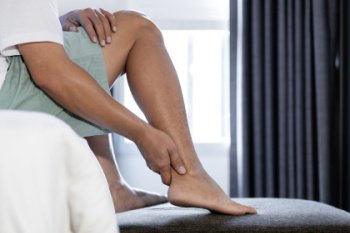
Achilles tendon tears occur when the tendon connecting the calf muscles to the heel bone is overstretched or ruptured, often during activities that involve sudden movements or intense stress, such as jumping or sprinting. Common causes include sports injuries, falls, or sudden increases in physical activity without proper conditioning. Risk factors include aging, tight calf muscles, and certain medications that weaken the tendon. Symptoms of an Achilles tendon tear include a sharp pain in the back of the ankle, swelling, difficulty walking, and an inability to push off the foot or stand on tiptoes. Some may hear a pop sound at the moment of injury. Diagnosis is typically made through physical examination, where a gap in the tendon may be felt, along with imaging tests like ultrasounds or MRI scans. Treatment options range from rest and immobilization in mild cases to surgery for more severe tears. If you have injured your Achilles tendon, it is suggested that you schedule an appointment with a podiatrist for a proper diagnosis and treatment.
Achilles tendon injuries need immediate attention to avoid future complications. If you have any concerns, contact one of our podiatrists of Bergen Foot & Ankle. Our doctors can provide the care you need to keep you pain-free and on your feet.
What Is the Achilles Tendon?
The Achilles tendon is a tendon that connects the lower leg muscles and calf to the heel of the foot. It is the strongest tendon in the human body and is essential for making movement possible. Because this tendon is such an integral part of the body, any injuries to it can create immense difficulties and should immediately be presented to a doctor.
What Are the Symptoms of an Achilles Tendon Injury?
There are various types of injuries that can affect the Achilles tendon. The two most common injuries are Achilles tendinitis and ruptures of the tendon.
Achilles Tendinitis Symptoms
- Inflammation
- Dull to severe pain
- Increased blood flow to the tendon
- Thickening of the tendon
Rupture Symptoms
- Extreme pain and swelling in the foot
- Total immobility
Treatment and Prevention
Achilles tendon injuries are diagnosed by a thorough physical evaluation, which can include an MRI. Treatment involves rest, physical therapy, and in some cases, surgery. However, various preventative measures can be taken to avoid these injuries, such as:
- Thorough stretching of the tendon before and after exercise
- Strengthening exercises like calf raises, squats, leg curls, leg extensions, leg raises, lunges, and leg presses
If you have any questions please feel free to contact our offices located in Fort Lee, NJ and Flushing, NY . We offer the newest diagnostic tools and technology to treat your foot and ankle needs.
